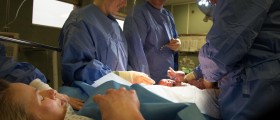
According to a new study, the mode of delivery probably doesn't impact a woman's psychological well-being six months after she had her baby. The researchers concluded: "Concern for maternal mental health after delivery should not influence clinical decision regarding mode of delivery." Just what did the study team, led by Dr Samantha Adams from the Akershus University Hospital Health Services Research Centre in Norway, look into?
Exploring the idea that an increasing number of pregnant women is choosing cesarean sections to improve their mental health, they asked over 55,000 Norwegian mothers participating in the Mother and Child Cohort Study about their state of mind during pregnancy and after. The conclusion was that the mode of delivery actually didn't affect a woman's psychological well-being after having a baby much, but that the strongest indicator of stress six months after delivering a baby was a negative state of mind during pregnancy.
Women who took part in the study rated their feelings on a scale of one to four, answering whether they were feeling fearful, nervous or scared. The study included normal vaginal deliveries, vaginal births with the help of instruments, emergency c-sections and elective c-sections. The research team found that the deliveries that are seen as more stressful (like forceps and emergency c-sections) did not cause higher levels of distress six months after the fact. In contrast, those who were feeling fearful, nervous or scared during pregnancy were more likely to also feel that way six months after their babies were born.
















Your thoughts on this
Loading...